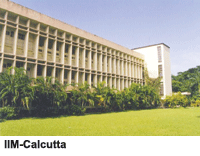 Although established way back in 1961 as the country’s first internationally benchmarked B-school amid high hopes and much jubilation, over the past 49 years the Indian Institute of Management-Calcutta (IIM-C) has lost much of its sheen and élan. Hardly surprising given that for the past 33 years it has had to teach capitalist business management nostrums and principles under the eagle eye of the pro-Beijing Communist Party of India-Marxist (CPM) which has ruled its host state of West Bengal (pop. 80 million) continuously since 1977. During this barren interregnum, the CPM and its leftist coalition governments have not only de-industrialised West Bengal and provoked a flight of capital from this once frontline industrial state of the Indian Union, but also driven much of its middle class into exile.
Although established way back in 1961 as the country’s first internationally benchmarked B-school amid high hopes and much jubilation, over the past 49 years the Indian Institute of Management-Calcutta (IIM-C) has lost much of its sheen and élan. Hardly surprising given that for the past 33 years it has had to teach capitalist business management nostrums and principles under the eagle eye of the pro-Beijing Communist Party of India-Marxist (CPM) which has ruled its host state of West Bengal (pop. 80 million) continuously since 1977. During this barren interregnum, the CPM and its leftist coalition governments have not only de-industrialised West Bengal and provoked a flight of capital from this once frontline industrial state of the Indian Union, but also driven much of its middle class into exile.
Given this hostile and unsupportive environment in which it has to teach, learn and research, it’s small wonder that in the annual B-school rankings of the country’s business periodicals and pink papers, while IIM-C is routinely included in the top 10 rankings, it is seldom ranked numero uno. For instance in the Business India 2009 list it was ranked third; Businessworld second; Outlook third and the parvenu Business Directory third. Among the pink broadsheets, The Economic Times ranked it third and Business Standard third.
Against this dispiriting backdrop, headline reports dated March 9 in dailies countrywide that an (unnamed) IIM-C 2010 batch graduate has received the highest pay package offer in the recently concluded placements season of the country’s eight IIMs, have provoked euphoria bor-dering on exultation. The unidentified (for security reasons as previous high fliers have received extortion and kidnap threats) IIM-C graduate receiv-ed a start-up pay offer of $350,000 (Rs.1.57 crore) from the Union Bank of Swizerland for a Singapore posting.
“It’s not just the highest pay package offer that’s made us happy. It’s the fact that our entire class of 278 got jobs they wanted,” says Samyukktha Thirumeni, external relations secretary of IIM-C.
Among the major recruiters of IIM-C graduates of the batch of 2010 were Yes Bank (13 offers), ICICI Bank (10) and American Express (6) among finance majors, while 27 percent of the institute’s mint fresh MBAs signed up with consultancy companies. Among the consultancy heavyweights the major recruiters were Accenture and Cognizant. Ironically ITC Ltd — the cigarettes, hotels, and agri-produce FMCG (fast moving consumer goods) transnational which dominates contemporary Kolkata like a colossus and whose durable chairman Yogi Deveshwar chairs the IIM-C board — recruited only three of the 278-strong batch of 2010.
Nevertheless with remuneration packages offered by domestic companies averaging Rs.15.32 lakh (per annum) and foreign companies $123,450 (Rs.55 lakh), there are no complaints. “It’s like being back to the glory days of IIM-C,” says Prof. Prafulla Agnihotri, chairman of the IIM-C placement committee.
While IIM-C faculty optimists ascribe this unexpected revival of its fortunes to the bounced back economy and the institute’s resilience, cynics are ascribing it to the anticipated end of CPM rule in West Bengal, following the state legislative assembly election scheduled to be held in the summer of 2011.
Sujoy Gupta (Kolkata)